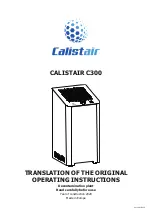
31
6.4.9 Luff extrusion
Drum unit and eye lower terminal must be removed before the luff extrusion can be dismantled.
1. Place the Furlex on a flat surface and make sure that the luff extrusion is kept straight.
2. Push out the lower bearing halves using a screw driver or similar. Be careful not to damage the hole in the
luff extrusion.
3.
Remove sail feeder and top guard.
4. Feed the exposed lower join sleeve (at sail feeder level) down to release the lower connector and split the
join. The lower 1000 mm (39 3/8”) luff extrusion and distance tube can now be removed.
5. Use the disconnected join sleeve to push up all the the remaining distance tubes and joins until all joins
disconnect. Hold tight on the luff extrusion while knocking on the join sleeve with a hammer. Use a piece of
wood or similar so that the join sleeve is not damaged.
6. Collect the connectors at each join and pull out the wire.
6.4.8 Halyard swivel
The halyard swivel is removed from the system by sliding it downwards in
conjunction with dismantling the sail feeder and removing the drum unit.
Alternatively, the halyard swivel can be slid up after the top guard has been
removed.
In both cases the stay needs to be detached from the boat.
Fig. 6.4.8.a
Fig. 6.4.9.a
If the halyard swivel is to be removed, the rig must first be secured safely using a
halyard as a substitute for the forestay before proceeding. After disconnecting the
system from the boat’s stemhead, the drum unit and halyard swivel can be slid down
over the terminal or rigging screw and removed.










































